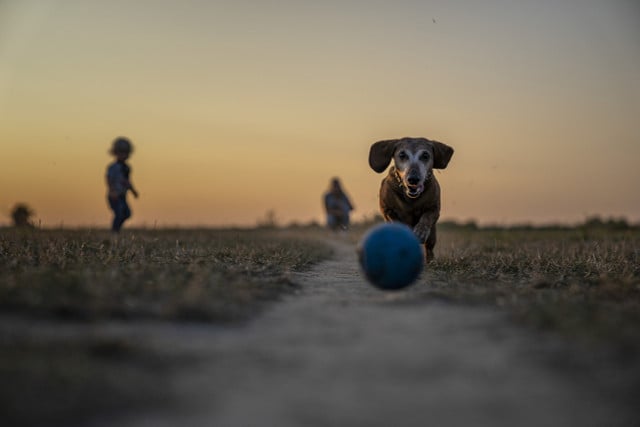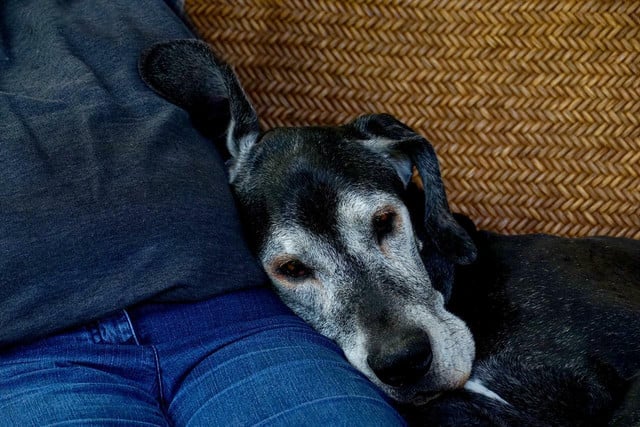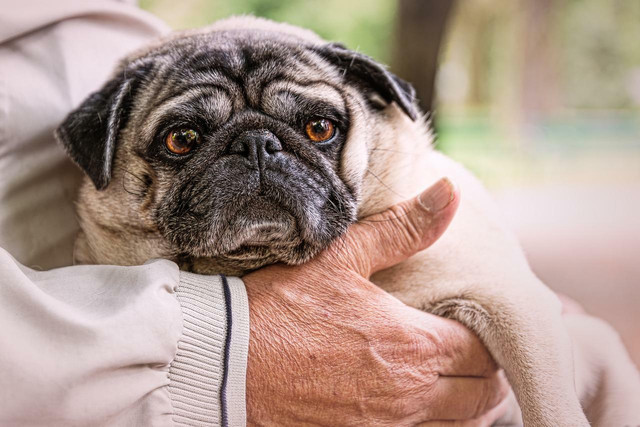Adopting an old dog can be one of the most rewarding things that you (and your pooch) can experience. But what are the pros and cons? Read on to find out more.
Taking on the responsibility of a pet, and in particular a dog, is something that should not be taken lightly. Your loving fur ball will demand a lot of love, care and attention from you, which he or she will only return to you in kind. While most of us will be drawn to the cuteness overload of puppies, adult and senior dogs also have a great deal to offer.
Older dogs end up in shelters or being given up for adoption for many different reasons. Sometimes their owner has passed away or has moved into an aged care facility where dogs are not permitted. In other instances, their owner might be overwhelmed with the financial costs of looking after a senior dog, their work arrangements have changed to the point where they cannot give their dog the right amount of attention, or they have welcomed a newborn baby to the family home and the dog has struggled to adapt to this change.
There are sadly more selfish reasons as to why someone might give up their adult dog, such as they would prefer a younger ‘cuter’ dog and they have grown disinterested in their senior dog, or the old dog has aged past its ‘usefulness’ when it comes to professional breeding. In any case, these senior dogs nevertheless deserve a stable and loving home environment to enjoy, especially in their final years.
Tip: If you are unsure whether you should get a dog — whether young or old — read our guide on the topic: Should I Get a Dog? 8 Things To Keep In Mind
The Benefits of Adopting an Old Dog



We can all agree that puppies are amazing, but don’t let those cute little faces distract you from the fact that they will demand a lot of your time, energy and patience to ensure they are well-trained and socialized with other people and pets in the long run.
Your daily routine might not afford you the time to do this effectively, which is only going to lead to behavioral problems down the line. Older dogs will for the most part be well past this naughty and destructive phase that most pups will go through.
Older dogs will almost inevitably be house-trained and more obedient than a rambunctious puppy, so bad behavior at the park, chewed up furniture and general canine-caused destruction around the home will be far less likely.
If you are adopting a senior dog, you will likely be provided a well-documented history of behavior that your dog has displayed, allowing you to determine whether or not the dog will fit into your home life and if it can co-exist happily with kids and other pets.
Older dogs will settle into a new home much more quickly than a pup, and will demand far less exercise than a younger dog needs. It can be very rewarding for pet owners to see any dog develop trust and enjoy its new home, and with older dogs, owners often feel a genuine sense of relief and gratitude from them, especially if the dog has spent a stretch in the pound waiting for their new forever home.
In summary, the pros of adopting a senior dog include:
- most likely house-trained
- most likely calm and not engaging in destructive behavior
- needs less exercise and outdoor time
- valuable emotional bond
The Risks of Adopting an Old Dog



It is often said that adopting an old dog means having less time with them, but as we know this can be the case with young dogs since it is impossible to predict sudden terminal illnesses or unexpected accidents that could claim their lives.
Still, you should remember that older dogs will be more susceptible to health problems or already come with them when you choose to adopt. This means added financial risk for you if regular trips to the vet become a theme with your adopted dog. Some rescue centers will offer long-term foster care, which means they will cover the vet costs for any existing conditions, but take this as the exception rather than the rule.
The most common health complaints in older dogs can include ongoing treatment for arthritis, urinary incontinence, diabetes, blindness, deafness as well as heart and respiratory problems, so you will need to consider these carefully as ongoing vet costs can really burn a hole in the back pocket.
While older dogs are often more well-adjusted than younger dogs, this can also mean they are more ‘set in their ways’ and a new home life that is jarringly different to their old one can be stressful for them. For these types of elderly dogs, transitioning into an adoptive home similar to their previous one would be ideal. It shouldn’t be a deal-breaker if this is not the case, since older dogs will adapt surprisingly well to change.
A lethargic older dog, for example, will usually respond very well to a new exercise routine appropriate to their age, developing muscle tone, improving circulation and will gain an extra dose of confidence and renewed twinkle in their eye. Becoming a member or regularly visiting a private dog park can be a great way to ensure your senior dog gets ample exercise and outdoor time in a safe and controllable environment.
While it is true that the personality of an older dog tends to be already set and they may be kind and gentle, physical ailments can cause them pain or fear. They might therefore be more reactive (which might even seem like aggression) around younger dogs or kids. It is important to be aware of the fact that you can never know for sure what your dog is feeling and it might behave in ways that don’t seem to fit their personality as you know it.
In short, the disadvantages in adopting a senior dog are:
- possible health problems
- financial risk
- harder time transitioning
- possibly higher reactivity around pets and children
Organizations That Offer Support When Adopting an Old Dog



A quick online search will show you a list of all local dog rescue centers in your area, where you will find older dogs available for re-homing, more often than not. You could also approach local dog breeders and find out if they have older ex-breeding dog that need re-homed. In most cases, these dog breeders will be glad to hear from you as they have grown attached to their dogs and will want them to give them the best opportunity to live out their twilight dog years in comfort.
Your local vet center may also be aware of some clients that need to adopt out their senior dogs, or you can even check the local classifieds for private advertisers looking to re-home their old dog for whatever reason.
In the U.S., however, The Senior Dogs Project should be your first port of call if you are serious about adopting an older dog in a responsible and compassionate fashion. Their experienced team offers excellent advice and information about taking on the adventure of adopting an old dog and can guide you through the process for the best outcome for you and your furry friend.
Some other notable organizations willing to offer sound advice about adopting an old dog include:
Read more:
- 5 Healthy No-Bake Dog Treat Recipes Your Dog Will Love
- Natural Tick Repellent for Dogs: Protecting Your Pet from Tick Bites
- DIY Dog Shampoo: 4 Different Recipes
Do you like this post?








